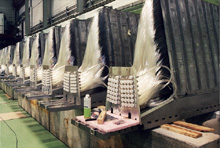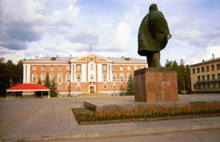 | Monday, August 2, 2004 |
|
Monday, August 2 THEORETICAL ASTROPHYSICS SEMINARS WILL RESUME IN THE FALL 3:30 p.m. DIRECTOR'S COFFEE BREAK - 2nd Flr X-Over 4:00 p.m. All Experimenters' Meeting - Curia II
Tuesday, August 3 |
|
Monday, August 2 Wisconsin Cheese soup Corned Beef Reuben $4.75 Chicken Provencale $3.75 Shephard's Pie $3.50 BBQ Panini with Pepper Jack Cheese $4.75 Meat Lovers Pizza $2.75 Kung Pao Chicken with Peanuts & Scallions $4.75 Wilson Hall Cafe Menu Chez Leon |
|
Extended Forecast |
Secon Level 3 |
| Fermilab Today is online at: http://www.fnal.gov/today/ Send comments and suggestions to today@fnal.gov Fermilab Today archive Fermilab Today PDF Version Fermilab Result of the Week archive Fermilab Safety Tip of the Week archive Linear Collider News archive Fermilab Today classifieds Subscribe/Unsubscribe to |
|
July 28 - July 30 - During this 48 hour period Operations established one store that combined with an existing store provided the experiments with approximately 37 hours and 38 minutes of luminosity. - MI suffered from corrupt MECAR data table - Recycler stashed antiprotons - TeV quenched during dry squeeze - Booster down due to a 480V breaker trip in the West Gallery Yard
View the current accelerator update |
|
From the Interactions News Wire, July 30, 2004 New Physics Law Unifies Several Superconducting Compounds UPTON, NY -- A research group led by a scientist at the U.S. Department of Energy's Brookhaven National Laboratory has discovered a simple relationship that mathematically links the properties of a class of high-temperature superconductors, materials that, below a certain temperature, conduct electricity with no resistance. This new, unexpected law applies to superconductors with very different structures and compositions, and may provide clues to understanding the mechanism of high-temperature superconductivity. It is discussed in the July 29, 2004 issue of Nature. read more |
|
Where the Wild Things Are Fermilab is a welcome respite of green fields and nature in the midst of vigorous suburban development. Employees and visitors routinely take advantage, walking, biking, fishing and just enjoying the scenery. We're home to one of the largest tall grass prairies in the country, hundreds of acres of wetland, and some of the last vestiges of oak savannah in Illinois. And with the richness of the plant communities,
Although we love to see all the wildlife, there is a down side. For every endearing bird 'n' bunny, there seem to be thousands of mosquitoes, ticks, spiders and wasps. Poison ivy, toxic plants and ecological disasters like multi-flora rose, purple loosestrife and garlic mustard abound. And even some of the cutest animals have their surly aspects! The most common animals we have on site, including raccoons, opossums, geese, bats, foxes, coyotes -- even whitetail deer, under some circumstances, can represent hazards. Although harmful encounters between humans and wildlife are extremely rare, when they occur, it's often because of human mistakes, usually a consequence of forgetting that our wild neighbors are indeed wild; not domestic pets. Never try to feed a wild animal, either directly or by leaving food out. That tends to break down the natural apprehension that animals have about getting too close to humans. In "surprise" or accidental confrontations, making a loud noise or acting in a threatening way normally will discourage any animal from aggression against humans. If you find that discretion is indeed the better part of valor, and need to exit, do so in a calm manner and keep your eyes on the animal -- don't run! Common sense in dealing with wildlife is still the best policy.
Have a great day and let's work safely all week!
|
|
Wilson Hall Exterior Window Washing This Week Window washing for the exterior of Wilson Hall will begins today. Scaffolds will be set up outside the building. Please avoid walking underneath the scaffolds and be aware of the workers. For more information, please call Enixe at x2798.
Upcoming Classes
Heartland Blood Drive Today and Tomorrow
Free English Classes
Scottish Country Dancing |


